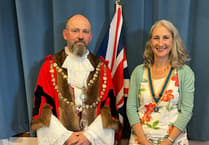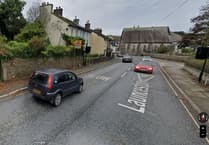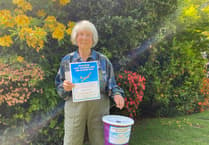TEARS of despair have turned into tears of joy for a West Devon man since his four-year-old son said Dad for the first time four months ago. Paul Lewis is autistic which means he has problems communicating and relating to the world around him. To look at him you would not know he had any disability, people have always assumed his challenging behaviour is down to naughtiness or that his parents are unable to control him. But Paul was never aware he was doing anything wrong. He was locked in his own world, the only thing he could to relate to was Thomas the Tank Engine. Yet over the last few months something amazing has happened. Paul has started to talk, recognise things, point and puzzle. He says goodnight to his parents and tells them he loves them and for Allen and Sheena Lewis, it is what they have been wishing for since the day Paul was diagnosed with autistic spectrum disorder in December 2003. Allen says he feels like he has won the lottery. He calls it a miracle but at the root of it all is an American phenomenon ? the Son-Rise Program. An initial sceptic, Allen was swayed by an old school friend whose autistic son had been through the programme and a deep desire to try absolutely anything to help his son. Earlier this year Allan attended a Son-Rise course in London, a turning point for him where all the emotions of the last four years came flooding out. ?It was amazing,? he said. ?I went in a bit unsure because I found the whole way Americans did things a bit over the top but it just blew me away. ?The woman from the programme had no inhibitions ? she was direct and effective and tapped into all our emotions. We were all sobbing one minute and laughing the next. There were these big chaps from the mines in Yorkshire and they were crying their hearts out. ?They got us to express our feelings and then showed us how to go about helping our children.? Son-Rise believes that children with autism are capable of learning, communicating, experiencing real joy and happiness and developing warm and satisfying relationships with the people in their lives. It uses dynamic, enthusiastic play-orientated methods which focus on socialisation and rapport building. Son-Rise facilitators join, rather than stop, a child?s repetitive and ritualistic behaviours like hand flapping, finger flicking, rocking or spinning and in doing so build a connection. The programme follows the simple idea of working from the child?s side towards yours rather than forcing a world of terms and conditions upon people to whom it makes no sense. Allen Lewis and a team of local volunteers practising the techniques and methods of Son-Rise are working with Paul up to 10 hours a day in a custom-built playroom, which was built in the family garden, away from distractions, with funds donated from the community. His eye contact has improved dramatically and his vocabulary extends to over 100 words. In his playroom Paul is effectively removed from the outside world in order to prepare him for it. He is observed through a two-way mirror and his overjoyed parents have seen him interacting with others for the first time, focusing his energy and having fun. ?Paul will copy anything you say but more importantly he is now saying things and understanding what they mean ? like the other day he said sorry when he bumped into me,? said Allen. ?Every night we tucked him into bed and he never said anything but four months ago he said good night Dad, see you in the morning, I love you. I could have done a headstand, it felt like the best moment of my life.? Allen said he had to overcome his nervousness and embarrassment and just ?go with? the principles of Son Rise: ?I copy my son when he is flapping his arms about in the street and I don?t care what people think of me. It is about accepting his behaviour ? it is OK to flap, who gives a damn.? Paul?s progression was obvious when he recently visited his consultant, a year after the last visit and bowled over the doctor. ?Last year Paul did not speak any words and he was all over the place, literally climbing the walls. But this last visit he sat in the chair and spoke to the doctor and there was a real calmness about him. ?It was a milestone day and the doctor was so impressed he has been to see the work we are doing in the playroom.? Allen?s wish is for Son-Rise, which has been operating in America for 25 years, to be accepted as a form of treatment by the professionals in Britain. ?There are many therapies and different things work for different people,? he said. ?But I have seen children recover from autism on the Son-Rise program and I believe that one day my son will lead a normal life too.? The Lewis? say Paul?s behaviour was ?less manic? now but living with an autistic child was hard work. However they do not seek respite, even with two other young sons to look after. ?If we go anywhere Paul comes with us ? it would be like one of my limbs had been cut off if he was not there,? said Sheena. ?We have received tremendous help from the community, the pre-school and Tavistock Primary School where Paul attends part-time and ever since he was diagnosed, the system has worked for him. ?It was a relief when we found out what was wrong with Paul as we knew there was something not quite right from an early age,? said Sheena. ?He used to rock from side to side in the shopping trolley, never uttered a word at the age of two and would not give you eye contact. ?Thomas the Tank Engine was Paul?s best friend and when he was playing with his trains he would burst out into fits of laughter. He was completely absorbed, totally unaware of what was going on around him.? With no sense of danger, what was right or wrong, Paul?s behaviour would include putting his hand in a pan of boiling water to fetch out a carrot, pouring paint all over the kitchen and running his toy cars through it and swinging on the ceiling lights. The family home has been adapted to make it safer for Paul and Allen stays at home to look after his son, while Sheena works part-time. Paul?s progress has had a major affect on his brothers Lee, 10 and Mark 5, who had found it hard to deal with his disability, and his step sisters who are now getting cuddles off the youngest member of the Lewis family. ?We still have a long way to go and Paul is still in nappies but every day we see an improvement,? said Allen. ?Son-Rise is intensive and exhausting but it is completely worth it to see the achievements Paul is making. ?Paul just cannot wait to get into that playroom ? he literally drags all the volunteers into it. We have 12 volunteers who work with him and they are learning the techniques of Son-Rise by watching the programme facilitators in action. They are terrific.? The Caudwell Charity has been able to fund 90-95% of applications for Son-Rise courses in the UK which cost between £1,000 and £1,500. Nine hundred places have been funded so far for three courses which are set in a theatre and work on the attitudes of parents, introducing them to the techniques they can use at home. It can be used on children and adults challenged by autism, autism spectrum disorder (PDD), Asperger?s syndrome, Attention Deficit Hyperactivity Disorder (ADHD) and other developmental difficulties. Charity administration manager Lisa Bates said this was one of a number of therapies for autism which the Caudwell Charity supported: ?We put the onus on parents to tell us what they want for their child because we feel the parents are usually the experts,? she said. ?We have found that with Son-Rise it brings families together because it teaches an acceptance of the child and it is kind on the child.? As well as the UK courses, there is currently one outreach teacher and two facilitators working for the Son-Rise Program in the UK. To implement the programme full-time, a rota of volunteers ? a constant source of energy ? is important to keep up the intensive play. Anyone who wants to apply for a donation or learn more about the Son-Rise Program can contact the Caudwell Charity on 0845 300 1348.



